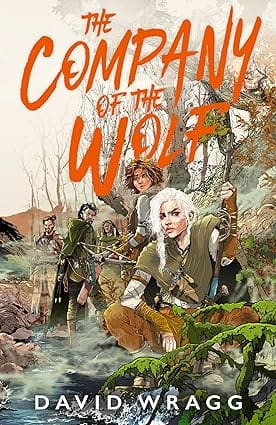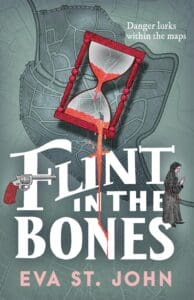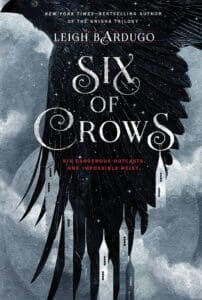
From Wraggs to Riches
Synopsis
Seeking a better life, Ree and Javani have traveled west into the mountains, and left their pasts – and their troubles – behind. But new places bring new problems, and when they stumble across a lone traveler under bandit attack, they make the mistake of lending a hand.
Forced to take refuge in the traveler’s village, they quickly find allies among the lush, wooded hills. But then the true nature of the bandits is revealed.
With winter approaching and a vengeful company of mercenaries circling like wolves, Ree and Javani must uncover the secrets of this peaceful valley . . . or risk the ruin of it all.
Review
David Wragg is evolving, and not since Darwin and those excessively large tortoises has the science of change been so exciting to watch.
The wise-cracking fantasy author was first introduced to the world through his endlessly entertaining Articles of Faith Duology, which featured brilliantly funny dialogue and mercenary-with-heart hijinks in a vaguely Eastern European world with a refreshingly innovative approach to worldbuilding (“you’re on your own, son”).
Last year we got the first book in his new Tales of the Plains trilogy, The Hunters, which was a statement of intent if there there was one that Wragg was getting more ambitious. Set in the same world as before, albeit the more Middle-east inspired northern deserts and plains of his world, it combined the non-stop pace of relentless chase sequences with strong, deep character work, and was one of the most memorable fantasies of the year.
Now we get the second entry, The Company of the Wolf, which for me represents Wragg’s almost final form; this is a masterpiece of the book, a fantasy marvel, that will simultaneously be the funniest fantasy you will read all year while also being the one most likely to make you leak vast quantities of salt water when you least expect it.
The first great thing about this book is that, after the frantic dashes of the previous tome, it is essentially set in one location. Ree, the warrior turned middle-aged mother figure to her increasingly capable daughter Javani, seek to pass the mountains to get to the alleged utopia on the other side, but end up in a strange remote village nestled in a mountain valley. It soon becomes clear that this village of peaceful nomads, who have congregated here from their other walks of life for various reasons, is in danger from a freelance military outfit ostensibly promising protection, and Ree and Javani might be their only saviour from an all-out assault on the village.
If this sounds familiar, then it’s because it’s essentially a take on The Seven Samurai/Magnificent Seven. But Wragg isn’t just here to copy the greats; in creating a village of phenomenally compelling and curious characters who must face up to the age-old choice of foolish peace or reluctant violence, he is creating his own classic. The desperation of Ree to make these pacifist villagers see the true nature of the threat they are up against versus their distrust of her as the cause of bringing this violence to their doorstep is a strong narrative thread that Wragg pulls on repeatedly to great effect. There are deep themes here about the nature of violence and the merits of action, whether people can change and whether they should change. Wragg is no longer hinting at thematic depth in his books; he is wading headfirst into their depths.
But the true joy of this book is the characters. Almost every villager, from the curiously stubborn village leader Camellia to the hilariously brusque and obnoxious hermit hunter Anri, feels fleshed out and vividly real, and as Ree and Javani get to know them I felt a strong sense of brotherhood emerging with this motley crew until my desperation for their survival became a burning need. The trick Wragg pulls off like a fantasy David Copperfield is to hint at reasons for the way they are and then slowly pull back the curtain with devastating effect to give us the full answers. Anri’s story in particular is as brutally poignant as it is refreshingly unconventional. This is a book that asks us not to judge people but to question how they became the way they are, and whether they can be redeemed.
However not everyone can be redeemed, and in the cunning, Machiavellian, smug, slimy creation of Lado of Cstethia, Wragg has given us one of the defining fantasy villains of the decade. One of the secrets to making a great unredeemable villain – as opposed to the ones we are meant to empathise with – is to make their actions so frustratingly obvious in their deception yet the outcome so successful, while simultaneously making the villain so gleefully self-satisfied in their lying. Or in other words, make them the biggest bastard to ever be conceived. Lato, who twists the mercenaries into a unit devoted to the destruction of the villagers with an ever escalating mountain of absurd, Trump-like rhetoric, is one such bastard. He is incredible. Your blood pressure will rocket whenever he is around.
Of course, Wragg is still one of the funniest if not the funniest fantasy authors plying his whiplash quip trade, and this book probably has the most laugh-out-loud lines of his catalogue so far. I took great pleasure in particular from one of Wragg’s trademarks, the overly loquacious character, in the form of the token good mercenary Captain Manatas, whose excessively formal long-winded dialogue is a constant joy just as Ree’s ribbing of it is. Wragg is also, perhaps for the first time, interested in a romance, and Ree and Manatas’ hesitant steps in this regard are pitch perfect, hinting at new reservoirs of tropes in Wragg’s armoury.
But it’s the combination of everything I’ve been yakking about for the last few paragraphs – character and wit – that makes this book so remarkable. There are moments of true sorrow and poignancy in this book that destroyed me. Wragg is going for the heartstrings with this one – I choked up on five separate occasions, and not a single one did I see coming. And yet mere moments later Wragg had me chuckling along to a fantastically conceived one liner. There are some fantasy authors that can wreck you emotionally. There are some who can entertain and amuse. With this book, Wragg shows he can do both on the same damn page, and I honestly can’t think of many other fantasy authors who can manage that devilishly tricky tonal highwire act.
Overall, with diamond wit, blade-sharp dialogue and a cast of characters so compelling I’d give my right hand to save them were they real, this is not just Wragg’s best book, but everything I adore about modern fantasy in one volume. Wragg is among the greats now.









Leave a Reply